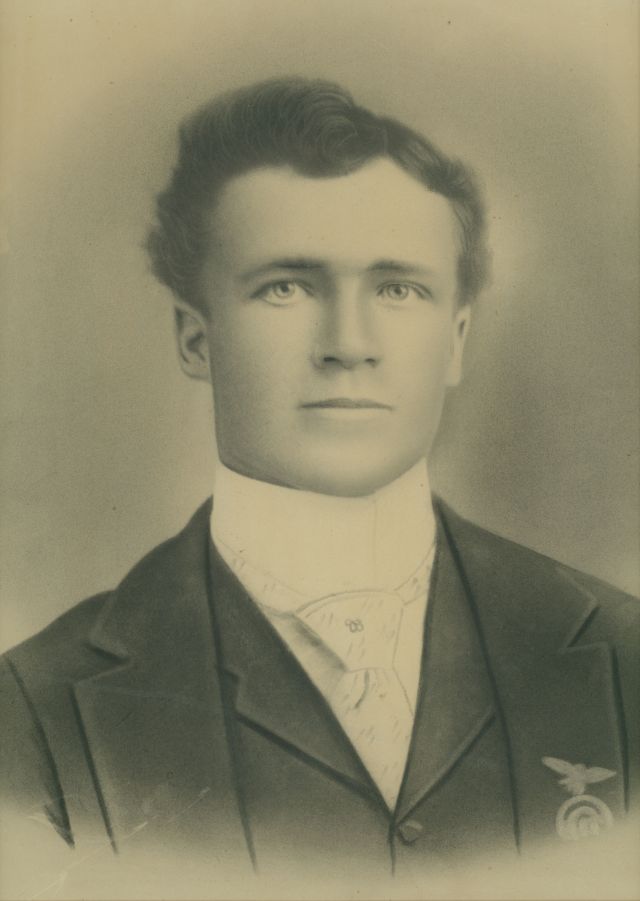
Rufus Orrin Barker
Bushman Family History by Newbern I. Butt, p. 22:
Major occupation, farmer and poultryman. One year of college work at Snow College. Was watermaster at Fairview for 15 years. Active in Church choir, Sunday School teacher and in S.S. Superintendency 10 years part of time as Supt., MIA counselor, Scoutmaster 3 years, active in Seventies Quorum, home missionary work and ward teaching.
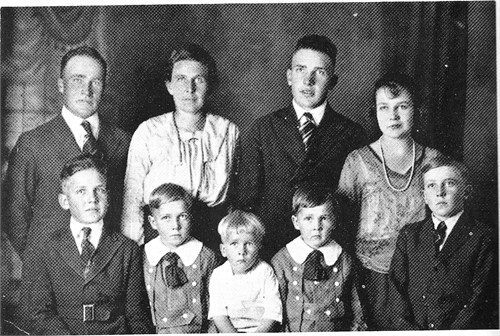
Orrin and Gladys Barker Family
Things I Remember About My Father by Rufus Orrin Barker
By Eugene Barker, his youngest son
The things I write about are the things I remember about my father as well as some of the things he told me about himself. These things will not be in sequence.
My father was a small man in size, but a large man in character. He had great compassion for other people, especially those that were handicapped. He was honest in all his dealings and many times came up on the short end of a deal because he would not take advantage of anyone.
One time Brother Day wanted to trade horses with Dad. The horse he wanted was a beautiful horse, but was balky. Dad told Brother Day the horse wasn’t a good one, but Brother Day insisted, so they traded. After a day or two Dad told mother that he had beaten Brother Day in the trade and it wasn’t right, so he took the horse back to Brother Day. When Brother Day saw him coming, he said he knew he would because he was such an honest man.
One of the first trips with my Dad was to the Dry Farm where he was preparing the ground for planting. We had a good time as we had to camp out. Dad always had good horses and believed that they should be well cared for. I never saw him abuse any animal. He loved to pull his horses and was proud of them when they performed well. I remember once when some Gypsies came to Fairview. They would brag about their horse and challenged Dad to a pulling contest. Dad’s horses really outdid themselves that day and the Gypsies’ horses couldn’t pull their load.
I can remember twice that Dad’s horses probably saved his life. The first time he had been hauling timber one winter near Winter Quarters or near the town of Schofield. He had tipped a bob sleigh of logs over and had broken his ribs. He was in really bad shape, so the men he was working with tied him to his bob sleigh and sent him alone across the mountains to Fairview. Why they ever sent him alone I’ll never know. His horses bucked huge snowdrifts. Afterwards, Dad said some of the drifts were as high as the horses. We were living in the Old Cottage Hotel in Fairview. About 1 a.m. in the morning mother heard a noise outside. She got the older boys up and went out and there was Dad nearly frozen to death, but his faithful horses had brought him home. He was down in bed nearly all winter and they didn’t have insurance as we do now.
Another time Dad was alone over on the Dry Farm by Hill Top. He had been plowing and began to feel ill. He knew that he had better get home. (He might have suffered a partial stroke or heart attack.) He unhitched the horses from the plow by crawling on his hands and knees. He then hitched them to the wagon. I guess he had a hard time getting into the wagon. He tied the lines to the wagon box and then laid down in the box. The horses brought him up over the hills and home to the farm, a distance of nearly twelve miles. He soon recovered and was about his work again.
Writing about Dad wouldn’t be complete without mentioning his garden. He always had good gardens and loved to work in them. He made a deal with Don and I that if we would do the chores he would tend the garden. So we didn’t have to do the garden work. He had his own special sweet corn and squash. He had developed squash that would keep for a long time. We had a few people that always bought their vegetables from him. One year as we delivered the squash in the Fall to some people, the man said he wanted to show us something and he showed us a squash he had had since the year before and it was still solid.
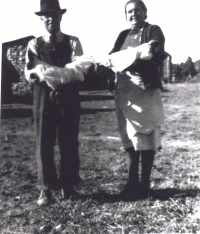
Orrin and Ella with prize chickens
Chickens were another part of his life. He developed some of the largest leghorn chickens in the State. He had a breeder flock of chickens and sold eggs to the hatchery in Manti. Chickens from his flock were sought after by many chicken farmers.
He sometimes incubated the eggs in a small incubator. He could hatch about 200 chickens at a time. He told of one time, some Indians came by and wanted to know what the incubator was. Dad told them how it worked and if they would come back in 21 days they could see them hatch. In 21 days they were right there and sat in the front of the incubator all day long watching the little chicks come from their shells. They would laugh and giggle all the time.
Sometimes an old hen would want to set or hatch her own eggs. One time, Dad got some duck eggs. After the little ducks were hatched and had started to get around good, the old hen took them down to the canal for a drink. The instinct of the ducks told them it would be fun to take a swim so in they went. The poor old hen nearly had a nervous breakdown running up and down the bank trying to get her babies to come out of the water.
Raising chickens was not without its drawbacks. Dad would hatch the chickens and then brood them in tents. One year one of the tents caught fire and burned to the ground. Many of the little chicks were burned to death.
Dad kept close records of the eggs produced by each flock of chickens. Close by the door of the chicken coops was a chart where Dad kept track of the eggs. He had a pencil hanging by the chart. One day one of my cousins was visiting and he asked Dad what the chart and pencil was for. Dad told him, with a little grin, that when the chickens laid an egg they would go over and mark it down.
About laying chickens, the flocks have to be culled each year to get rid of the non-producers. Dad knew his chickens so well that this was no problem. He could even tell when a hen walked by whether it was a good layer or not.
Dad sent to Missouri for some pedigreed chickens. They were shipped as chicks, so we had to raise them with the other chicks we were raising. They had bands on their legs so we could tell them apart. As they grew Dad was so proud of them. But misfortune struck a couple of times. Dad was especially interested in the roosters to go with his flocks of chickens. Time came when our other little roosters had reached the fryer stage and we would kill them to eat. Dad was good at throwing, so one day he picked up an old buggy spoke. (Our young chickens just ran loose around the coops on the farm.) Well, Dad proceeded to get us some chickens. As he went to throw his stick at one of the roosters, (Dad could throw the sticks so it would just spin and he would hit the chickens in the head) one of his prize roosters ran by and he knocked off its head instead of the one he was aiming at. Boy, was he shook up.
Another time we were trying to catch some fryers for some people who were buying some for their own use. Well, I was chasing some and another of Dad’s prize roosters was with them. He ran under a limb on a cedar tree and didn’t duck. He caught the limb just right and broke his neck. I don’t think Dad ever did believe me when I told him what had happened. It was quite a freak accident.
Dad had a good sense of humor. One time some of Reed’s friends had been to the farm and we had an old Model “T” car at that time. One of the fellows had tied one end of the rope to the crank and they had been playing jump the rope over a post. A day or two later one of our cousins was visiting and he noticed this rope and wanted to know why the car was tied up and Dad told him, in all seriousness, that it had been sucking the cows and they had to tie it up.
Another time one of my cousins, who was quite a speedster when he drove a car, came out to the farm, speeding as usual. He left quite a string of dust as he drove up the old dirt road from Fairview. When he arrived at the farm, the dust was still hanging over the road, so he asked Dad what that was a sign of and Dad said, “It looks like a sign of the last days.”
We had a good friend, Brother Brady. One day he came to visit and Dad had on this old battered straw hat. Brother Brady said it looked so comfortable he would like to trade hats with Dad. So Dad traded for Brother Brady’s good one. Brother Brady laughed about it lots of times; how burned up his wife was when he got home.
He fixed our shoes and cut our hair and I always thought he did a very good job.
Dad was very ambidextrous. He could throw a ball or rock, etc. as good with one hand as the other. He liked to play ball and could pitch with either hand. I think he could have been a good baseball pitcher.
This ability to throw came in handy sometimes and was also quite humorous. One time the thrashers were at our farm and when they came, there were usually quite a few men to help with the grain and run the thrasher. This day Dad was bringing some eggs from the chicken coop and one of the fellows, in fun, said, “I’ll bet you can’t hit me with one of those eggs.” Dad just smiled and picked up an egg in each hand. He threw the egg in his right hand first and just behind it came the egg from his left hand. The fellow ducked the first egg, but the second one splattered all over him. Boy, was he surprised! Everyone had a good laugh over the result.
More than once, Dad brought home sage hens for dinner. These he had killed just by throwing rocks at them.
Many winters Dad would go to the mines to work to earn a little extra needed money. One winter he had gone to Park City to try to get a job. Bazil was working there at the time. Work was scarce, so every day Dad went to the mine office to “rustle” or try to get work. Because he was so persistent he finally got a job. Some of the men who had been trying for jobs were angry and were going to fix Dad so he would quit and go home. One night as he was coming off shift and was walking down this path in the canyon, these men blocked his way and told him they would fix him for being so smart. He told them that before they did anything, that they should know something. He then calmly picked up some snow and formed two hard snow balls. He then pointed to a tree that a limb had been cut from and a large knot showed up quite well. He then threw with his left hand and hit the mark dead center. Then he threw with his right hand and hit the mark dead center. He then told them he could use both his hands in other ways just as well. They were awed and let him go and never bothered him again.
Dad was a good wrestler and so it became a custom with the older boys that on their birthdays they had to try to throw him. I’m not sure that anyone ever did unless it was after he was older.
Another time when the thrashers were at the farm, Dad was watering his horses at the canal and a young fellow, who was quite husky, was watering his horses at the same time. He came up to Dad and grabbed hold of him and jokingly said, “I’ll bet you can’t throw me.” He had a side hold on Dad and this was Dad’s favorite one. He took the challenge, and it seems very effortlessly proceeded to throw the fellow in the canal.
Dad was very strong for his size and this could have led to some of his poor health in later years. It seems that when men gathered together at threshing time, they were all trying to outdo each other. I often wonder how any of them lived very long.
Dad always had good cows. His favorites were the Durham breed. I remember one cow that liked to be milked first and would sometimes push you off the stool if you tried to milk one of the other cows first.
Dad was a good sheep shearer. He sheared all our sheep when we had our little flock. After he and mother got married, he went on a shearing trip up into Idaho in an effort to make some money. Once he got very sick and then he said that it felt as though something had broken inside him. In later years he wondered if maybe he had had appendicitis. But if he had, how did he live through the broken appendix?
His whole life was plagued with struggle and hard times. He spent may winters in the mines in an effort to make extra money to help with some of the farm expenses.
While at one of the coal mines in Carbon County, they had to come off the side of the hill to the boarding house. Some of the braver men would come down the hill on the car rails. They would sit on a little sled that was more like a little seat with two guides that fit on each side of the rail. The rider would sit on the sled with his feet up on the rail and down the hill he would go. If there were two men, one could be on each rail and then they would hold hands to help balance them. Dad brought me one of the sleds once and I thought it would be so much fun.
Once during the depression, Dad got a job with his team working on the road of Fairview Canyon. He was really thrilled as he would get paid not only for himself but for his horses also. Disaster struck though, as he had only worked one day when the scraper he was operating slipped and cut one of the horses just above her hoof. This ended the job for Dad. The horse was always sort of a cripple after that.
Along with the depression came the drought. Dad had to sell his sheep and some of the cows for just a fraction of what they were worth. He also had to sell the Dry Farm to help keep the payments up on the other farm. I guess while talking about the farm, I should mention that Dad was very good at irrigating. He could seem to make the water cover more ground than we kids could.
Many times mother would take his lunch to him so he could stay with the water. Many happy moments were shared by Mother and Dad at times like these.
Once Don and I and Dad were hauling hay from the west field. We had our hay loaded and were driving back to the stack to unload. Dad was driving the horses and as we crossed the ditch on the ridge Dad slipped off the load of hay and fell between the horses. The horses ran away. Dad managed to hang onto the wagon tongue and gradually worked his way until he could get hold of the lines and got the horses stopped. Don and I were really scared. What could have been a serious accident for Dad turned out all right, mostly because of his calmness and quick thinking.
We were often plagued by coyotes on the farm. Once they killed about 30 turkeys just to be killing. Another time, they tore up a few sheep. This time Dad took after the coyote with the gun. He stalked it and killed it. Quite a feat considering how smart a coyote is.
Dad liked to run races with his boys. Sometimes he would put a quarter on a fence post. First one to get to the post got the quarter.
Dad was a good singer, and could either sing bass or tenor. He preferred tenor. He sang with the ward choir for many years. Sometimes he would sing as Mother would recite poetry. He wrote some songs and there are many that I wish we could find the words and music to.
He also liked to be in plays. One time he was taking the part of an Army man and he and another guy were to have a sword fight. They got a little bit carried away with their duel and Dad got his hand cut.
Dad used to sing a few funny songs. We had never been able to find the words to them, but we were fortunate enough to get the words from Ivan Cox, just before finishing this history.
UBADAM
Out West there are some funny towns and funny names as well.
There is a place called Ubadam 10 miles from where I dwell.
I met with a conductor once, who was a substitute,
He didn’t know the station and it led to a dispute.
“Where do you want to go,” said he, “Ubadam,” said I.
“I’ll not,” said he, and grabbing me to force me he did try.
A jab in the jaw and a kick below. He sure did make things hum.
When I got to Ubadam I was both deaf and dumb.
That night, when I returned home, my wife began to scold,
For all the supper she’d prepared had stood till it was cold.
“Where have you been tonight,” said she. “Ubadam,” said I.
With a grab she let me have a chair that stood nearby.
I left the room on the end of a broom and jumped the backyard fence.
She misconstrued the meaning and I suffered the consequence.
Next morning with my darling wife I tried to square,
Not knowing upon my coat was a long brown hair.
She took it in her fingers to compare it with her own.
And as it was much lighter I decided to leave home.
“Where did you get that hair,” said she, “Ubadam,” said I.
Forcing me upon the settee she festered my right eye.
I screamed, I yelled, I called for help, while dodging many a blow,
I blame that place called Ubadam, for all my griefs and woes
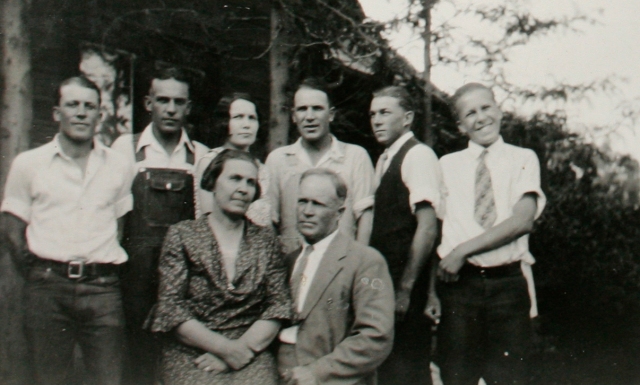
Orrin and Ella Barker Family
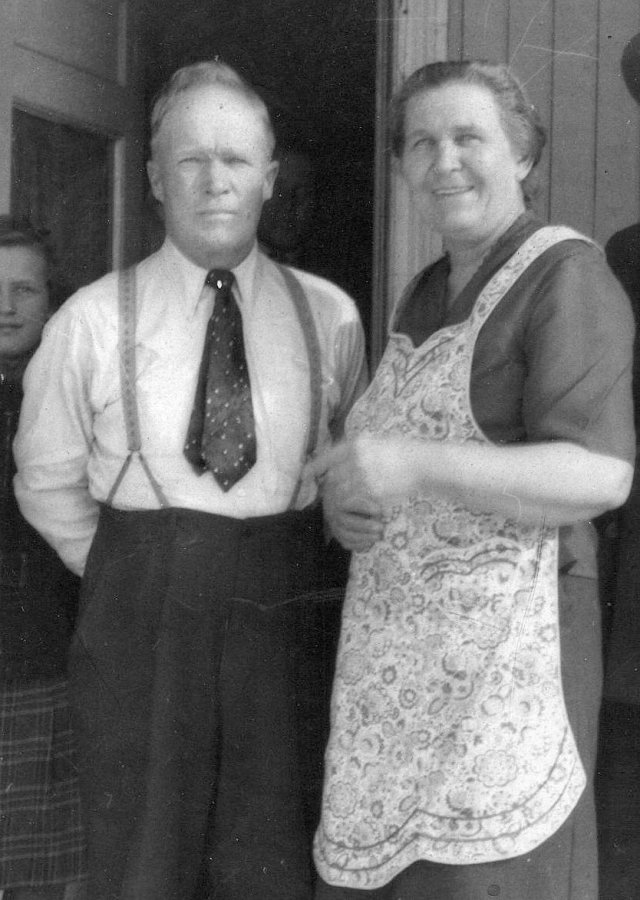
Orrin and Ella Barker


Pingback: Yuba Dam, 2020! | Folklife Today